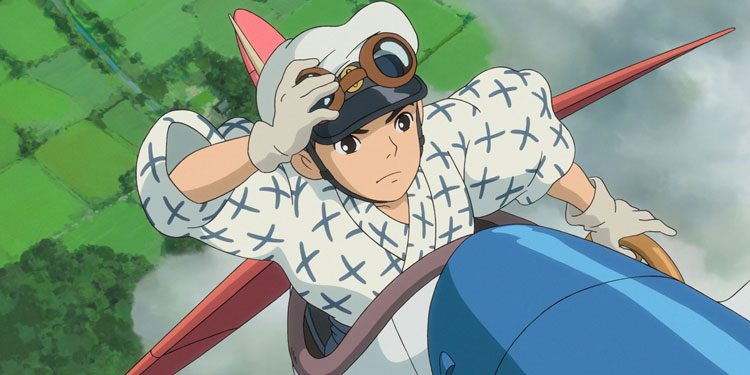
Director: Hayao Miyazaki
Running Time: 126 mins
Certificate: PG
Release Date: September 29th 2014 (UK)

While Japanese anime that covers weirdly sexual sci-fi, giant robots and horror has found its place in the West, what still seems like an anomaly to us are animated movies for grown-ups that don’t go that far into the fantastical. In fact for several reasons, and despite how good it is, it’s difficult to imagine The Wind Rises ever getting a release over here if it weren’t directed by the legendary Hayao Miyazaki (and it’s probably his last film).
The movie is a biopic of one of Miyazaki’s heroes, Jirô Horikoshi, starting with his youth as a young boy in the 1920s who dreams of being able to fly, but knowing that due to his bad eyesight he can never be a pilot. Once grown he heads off to university to become an engineer before getting a job helping to design planes.
He doesn’t just want to build great aircraft that ride on the coattails of the more technically advanced nations (particularly the Germans), but to surpass them and help Japan to pull itself into the modern age. He also meets and falls in love with Nahoko, who is stricken with tuberculosis.
It’s not just difficult to imagine this coming out over here if it weren’t a Miyazaki movie due to the fact that it’s a biopic of a Japanese man hardly anybody of us have heard over. Nope, Horikoshi also happens to be the chief architect behind the Japanese Zero, the fighter plane that helped attack Pearl Harbor and made Japan a far more formidable power in the air during World War II than it would have been otherwise.
Perhaps not surprisingly we don’t have a big history of releasing films lauding people who were on the other side of wars we fought, especially when the film is curiously silent about what it thinks about Japan’s decision to go to war – other than Horikoshi and his friend saying the only thing that matters to them are the planes themselves (the man himself was actually against the war, according to his diaries, although interestingly and presumably because of Japan’s complicated relationship with that part of its past, that’s not mentioned here).
I’m not saying this to criticise the film, in fact it adds an extra layer of interest to the film. Not that there’s nothing of interest elsewhere. It’s a charming and incredibly beautifully made film, and while it doesn’t contain too much of the fantastical imagination that many love in most of Miyazaki’s films (beyond some wonderfully rendered dream sequences), it retains his sharp and wonderfully honed storytelling style.
The subject isn’t too much of a surprise either. Miyazaki’s films have always been obsessed with the inner workings of machinery and most particularly aircraft of all sorts – often the more fantastical the better. If you go back and watch the likes of Laputa and Howl’s Moving Castle, you can see how much work went into working out exactly how the variation contraptions work, move and get their power. You can also feel in The Wind Rises the director’s admiration for the people who helped modernise Japan – even if there was a bit of a hiccough until 1945.
The passion is palpable and even if it is animated you can feel yourself being sucked into the Japan of the past. Initially the love story feels tacked on, but it’s soon fully pulled into the film and helps give it extra heart, particularly towards the end.
The Wind Rises has been given a wonderfully crisp transfer to Blu-ray, showing off the artistry of Studio Ghibli and Miyazaki’s attention to detail. There’s not too much in the way of special features, although the press conference announcing the completion of the film is oddly fun, largely because you can sense how little most of the participants want to be there, although Miyazaki himself does get more comfortable as it goes on.
Overall Verdict: It may lack the fantastical imagination of many of Miyazaki’s movie, but The Wind Rises is a great example of what has really set his films apart – the fact he’s a superlative storyteller. Watching a movie lauding a guy who ensured lots of allied soldiers died in World War 2 may be usual, but that doesn’t mean it can’t be a really good film.
Reviewer: Tim Isaac





Leave a Reply (if comment does not appear immediately, it may have been held for moderation)